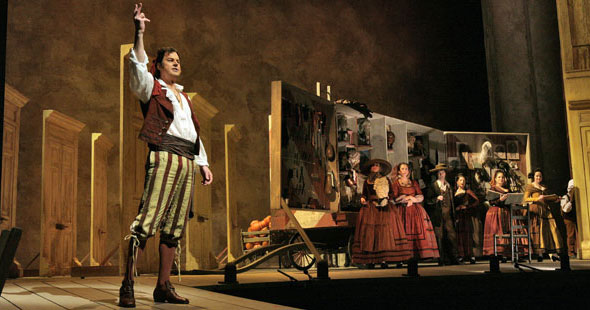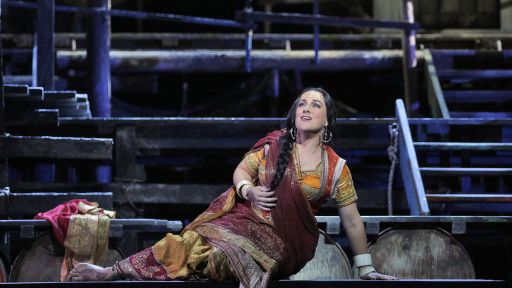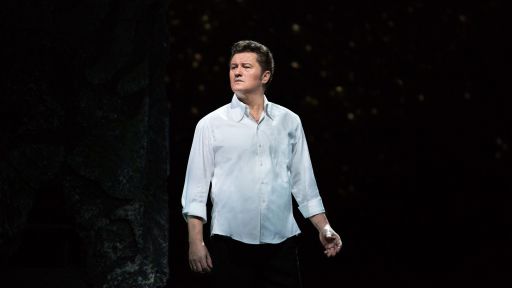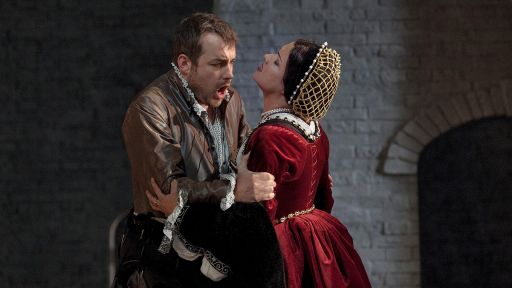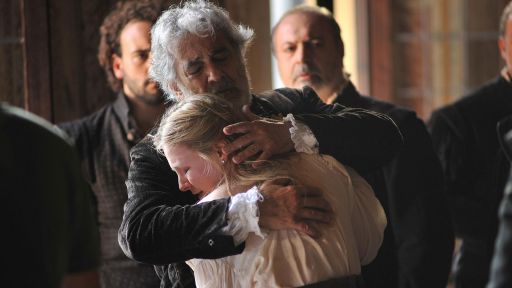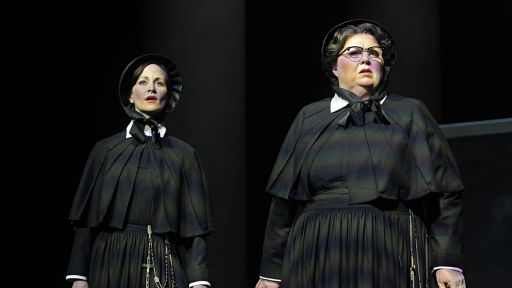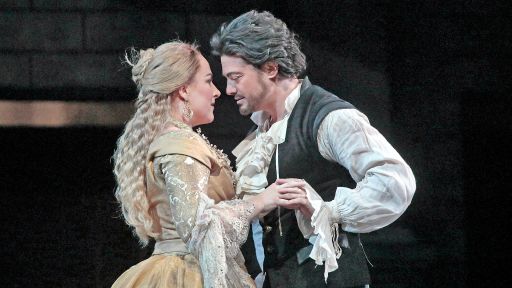Composer: Gioacchino Rossini
Librettist: Cesare Sterbini, based on the play by Pierre Beaumarchais
Production: Bartlett Sher
Conductor: Maurizio Benini
Performers: Joyce DiDonato (Rosina), Juan Diego Flórez (Count Almaviva), Peter Mattei (Figaro), John Del Carlo (Dr. Bartolo), John Relyea (Don Basilio), Claudia Waite (Berta), Mark Schowalter (Sergeant), Brian Davis (Fiorello), Rob Besserer (Ambrogio)
Synopsis:
Act I
Count Almaviva comes in disguise to the house of Dr. Bartolo to serenade Rosina (“Ecco ridente”). Dr. Bartolo keeps Rosina, whom he intends to marry, confined to the house. Almaviva pays the musicians and decides to wait until daylight in the hope of seeing her. Figaro the Barber, who has access to the houses in Seville and knows the town’s secrets and scandals, arrives and describes his busy life (“Largo al factotum”). The Count sings another serenade to Rosina, calling himself Lindoro, a poor student. Figaro devises a plan: the Count will disguise himself as a drunken soldier quartered at Dr. Bartolo’s house to gain access to Rosina. The Count is excited about this plan while Figaro looks forward to a nice cash payoff from the grateful Count (“All’idea di quel metallo”).
Rosina reflects on the voice that has enchanted her heart and resolves to use her considerable wiles to meet Lindoro (“Una voce poco fa”). Dr. Bartolo appears with Rosina’s music master, Don Basilio, who warns him that Count Almaviva, Rosina’s admirer, has been seen in Seville. Dr. Bartolo decides to marry Rosina immediately. Basilio praises slander as the most effective means of getting rid of Almaviva (“La calunnia”). Figaro overhears the plot, warns Rosina, and promises to deliver a letter from her to Lindoro (“Dunque io son”). Suspicious of Rosina, Dr. Bartolo tries to prove that she has written a letter, but she outwits him at every turn. Dr. Bartolo is angry at her defiance and warns her not to trifle with him (“A un dottor della mia sorte”).
Almaviva arrives, disguised as a drunken soldier, and passes Rosina a note, which she manages to hide from Dr. Bartolo. The old man argues that he has exemption from billeting soldiers. Figaro announces that a crowd has gathered in the street, curious about all the noise coming from inside the house. The civil guard burst in to arrest the drunken soldier. The Count reveals his true identity to the captain and is instantly released. Everyone except Figaro is amazed by this turn of events, and everyone comments on the crazy events of the morning.
Act II
Dr. Bartolo suspects that the “drunken soldier” was a spy planted by Almaviva. The Count returns, this time disguised as Don Alonso, a music teacher and student of Don Basilio (“Pace e gioia sia con voi”). He has come to give Rosina her music lesson in place of Basilio who, he says, is ill at home. Don Alonso also tells Dr. Bartolo that he is staying at the same inn as Almaviva and has found the letter from Rosina. He offers to tell Rosina that it was given to him by another woman, proving that Lindoro is toying with her on Almaviva’s behalf. This convinces Dr. Bartolo that Don Alonso is a true student of Don Basilio, and he allows him to give Rosina her music lesson (“Contro un cor”). Figaro arrives to give Dr. Bartolo his shave and manages to snatch the key that opens the balcony shutters. The shaving is about to begin when Basilio shows up looking perfectly healthy.
The Count, Rosina, and Figaro convince Basilio, with repeated assurances and a quick bribe, that he is sick with scarlet fever (“Buona sera, mio signore”). Basilio leaves for home, confused but richer. The shaving begins, sufficiently distracting Dr. Bartolo from hearing Almaviva plotting with Rosina to elope that night. Dr. Bartolo hears the phrase “my disguise” and furiously realizes he has been tricked again. Everyone leaves.
The maid Berta comments on the crazy household (“Il vecchiotto cerca moglie”).
Basilio is summoned and told to bring a notary so Dr. Bartolo can marry Rosina that very evening. Dr. Bartolo then shows Rosina her letter to Lindoro. Heartbroken and convinced that she has been deceived, she agrees to marry Dr. Bartolo and tells him of the plan to elope with Lindoro. A storm passes. Figaro and the Count climb over the wall. Rosina is furious until Almaviva reveals his true identity. Basilio arrives with the notary. Bribed with a valuable ring and threatened with a couple of bullets in the head, Basilio agrees to be a witness to the marriage of Rosina and Almaviva. Dr. Bartolo arrives with soldiers, but it is too late. Count Almaviva explains to Dr. Bartolo that it is useless to protest (“Cessa di più resistere”) and Dr. Bartolo accepts that he has been beaten. Figaro, Rosina, and the Count celebrate their good fortune.
Opera synopsis courtesy of the Metropolitan Opera
Funding for GREAT PERFORMANCES AT THE MET: “The Barber of Seville” has been provided by Toll Brothers, the National Endowment for the Arts, the Corporation for Public Broadcasting, the Sybil B. Harrington Endowment Fund, and PBS.
Related Web Sites
- Decca Classics: Juan Diego Flórez
- The Metropolitan Opera: Peter Mattei
- Joyce DiDonato
- The Metropolitan Opera: John Del Carlo
- John Relyea
- Claudia Waite
- Brian Davis
- The Metropolitan Opera: Interview: Rob Besserer
- The Metropolitan Opera: Features: Bartlett Sher
- The Metropolitan Opera: Maurizio Benini
- Classical Music Archives: Gioachino Rossini

